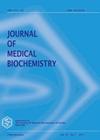The Clinical significance of serum synaptophysin like 1 protein levels in breast cancer
IF 2
4区 医学
Q4 BIOCHEMISTRY & MOLECULAR BIOLOGY
引用次数: 0
Abstract
Background: Mammography, used for breast cancer (BC) screening, has limitations such as decreased sensitivity in dense breasts. Currently used tumor markers are insufficient in diagnosing breast cancer. In this study, we aimed to investigate the relationship between serum levels of synaptophysin-like protein 1 (SYPL1) and BC, as well as compare SYPL1 with other blood tumor markers. Method: The study group consisted of 80 female patients with a histopathological diagnosis of invasive BC and didn’t receive any radiotherapy/chemotherapy. The control group 72 women with noprevious history of breast disease and evaluated as Breast Imaging Reporting and Data Systems (BI-RADS 1-2) on imaging. Serum SYPL1, cancer antigen 15-3 (CA 15-3) and carcinoembryonic antigen (CEA) were measured in both groups. Results: The diagnostic values of SYPL1, CEA and CA15-3 proteins in diagnosing BC were statistically significant. The sensitivity of SYPL1 was 48.75%, with a specificity of 80.56%. CA15-3 had a sensitivity of 80% and a specificity of 49.30%. There wasn’t statistically significant correlation between serum SYPL1 and tumor diameter, lymph node metastasis, distant organ metastasis, and stage. Conclusion: The serum SYPL1 maintained a higher discriminatory ability for BC. The serum SYPL1 level can be used with high specificity in the diagnosis of BC. Although SYPL1 has low diagnostic value in BC by itself.乳腺癌患者血清突触素样1蛋白水平的临床意义
背景:乳房x线摄影,用于乳腺癌筛查,有局限性,如在致密乳房敏感性降低。目前使用的肿瘤标志物对乳腺癌的诊断不足。在本研究中,我们旨在探讨血清突触素样蛋白1 (SYPL1)水平与BC的关系,并将SYPL1与其他血液肿瘤标志物进行比较。方法:研究组80例经组织病理学诊断为浸润性BC的女性患者,未接受任何放疗/化疗。对照组为72名既往无乳腺疾病病史的女性,采用乳腺影像学报告和数据系统(BI-RADS 1-2)进行影像学评估。检测两组患者血清SYPL1、癌抗原15-3 (CA 15-3)、癌胚抗原(CEA)水平。结果:SYPL1、CEA、CA15-3蛋白对BC的诊断价值有统计学意义。SYPL1的敏感性为48.75%,特异性为80.56%。CA15-3的敏感性为80%,特异性为49.30%。血清SYPL1与肿瘤直径、淋巴结转移、远处脏器转移、分期无统计学意义。& # x0D;结论:血清SYPL1对BC具有较高的鉴别能力。血清SYPL1水平可作为诊断BC的高特异性指标。虽然SYPL1本身对BC的诊断价值较低。
本文章由计算机程序翻译,如有差异,请以英文原文为准。
求助全文
约1分钟内获得全文
求助全文
来源期刊

Journal of Medical Biochemistry
BIOCHEMISTRY & MOLECULAR BIOLOGY-
CiteScore
3.00
自引率
12.00%
发文量
60
审稿时长
>12 weeks
期刊介绍:
The JOURNAL OF MEDICAL BIOCHEMISTRY (J MED BIOCHEM) is the official journal of the Society of Medical Biochemists of Serbia with international peer-review. Papers are independently reviewed by at least two reviewers selected by the Editors as Blind Peer Reviews. The Journal of Medical Biochemistry is published quarterly.
The Journal publishes original scientific and specialized articles on all aspects of
clinical and medical biochemistry,
molecular medicine,
clinical hematology and coagulation,
clinical immunology and autoimmunity,
clinical microbiology,
virology,
clinical genomics and molecular biology,
genetic epidemiology,
drug measurement,
evaluation of diagnostic markers,
new reagents and laboratory equipment,
reference materials and methods,
reference values,
laboratory organization,
automation,
quality control,
clinical metrology,
all related scientific disciplines where chemistry, biochemistry, molecular biology and immunochemistry deal with the study of normal and pathologic processes in human beings.
 求助内容:
求助内容: 应助结果提醒方式:
应助结果提醒方式:


